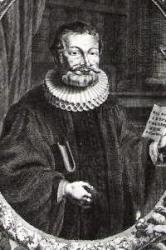
1562 - 1627 Person Name: V. Herberger, 1562-1627 Author of "Farewell I Gladly Bid Thee" in Evangelical Lutheran Hymnary Herberger, Valerius, son of Martin Herberger, furrier and poet at Fraustadt, Posen, was born at Fraustadt, April 21, 1562. He studied theology at the Universities of Frankfurt a. Oder and Leipzig, and became in 1584 master of the lower classes in the school at Fraustadt. In 1590 he was appointed diaconus of St. Mary's Church, Fraustadt, and in 1599 chief pastor; but in 1604 he and his flock were ousted from the church by King Sigismund III., of Poland, for the sake of the few Roman Catholics in the place. Out of two houses near one of the gates of the town they made a meeting-place, to which, as the first service was held on Christmas Eve, the name of the "Kripplein Christi" was given. He died at Fraustadt, May 18,1627 (Koch, ii. 301-311; Allgemeine Deutsche Biographie, xii. 28-29, &c).
Herberger published two sets of sermons, the Evangelische Herzpostille and the Epistolische Herzpostille. His famous work, the Magnolia Dei, de Jem Scripturae nucleo et medulla, 8 vols., 1601-l610, was designed to show Christ all through the Old Testament, but in his exposition he only reached the book of Ruth. As a pastor he worked unweariedly for the good of his people, especially during the time of the great pestilence (1613 to 1630), and during the troubles of the early part of the Thirty Years' War.
Herberger wrote only a few hymns, and of these the best known is:—
Valet will ich dir geben. For the Dying, first published on a broadsheet entitled :—
"A devout prayer with which the Evangelical citizens of Frawenstadt in the autumn of the year 1613 moved the heart of God the Lord so that He mercifully laid down His sharp rod of wrath under which nearly two thousand fell on sleep. And also a hymn of consolation in which a pious heart bids farewell (Valet) to this world. Both composed by Valerius Herberger, preacher at the Kripplein Christi." Leipzig, 1614.
The hymn was published in Mützell 1858, No. 6, in 5 stanzas of 8 lines. The title of the hymn itself is:—
"The Farewell (Valet) of Valerius Herberger that he gave to this world in the autumn of the year 1613, when he every hour saw death before his eyes, but mercifully and also as wonderfully as the three men in the furnace at Babylon was nevertheless spared."
In this pestilence 2135 perished at Fraustadt, but Herberger manfully stuck to his post, and passed through all unhurt, comforting the sick and helping to bury the dead.
The hymn is an acrostic on his name formed by the beginnings of the stanzas-—Vale (i.), r (ii.) i (iii.) u (iv.) s (v). It is one of the finest German hymns for the dying. It speedily passed into the hymn-books, and is still a favourite. In the Berlin Geistliche Lieder, ed. 1863, No. 1502. Sometimes given beginning "Abschied will" or "Lebwohl will."
The beautiful melody which appeared with the hymn in 1614 is by Herberger's precentor, Melchior Teschner, and is now well known in England, being included, e.g. in Hymns Ancient & Modern as St. Theodulph.
The translations in common use are :—
1. 0 World so vain, I leave thee, a good translation, omitting stanza iv., by A. T. Russell, as No. 248 in his Psalms & Hymns, 1851.
2. Farewell I gladly bid thee, a good and full translation by Miss Winkworth, as No. 137 in her Chorale Book for England, 1863.
Other translations are: (1) "Grant in the bottom of my heart," a translation of stanza iii. as No. 29 in the Moravian Hymn Book, 1742. (2) "Farewell henceforth for ever," by L. T. Nyberg, in the Moravian Hymn Book, 1754, pt. i., No. 451 (1886, No. 1227). (3) "Shelter our souls most graciously," by L. T. Nyberg, in the Moravian Hymn Book, pt. ii., 1746, p. 794 (1886, as pt. of No. 793). (4) "Vain world, forbear thy pleading," by Dr. H. Mills, 1856, p. 107. (5) "I bid adieu for ever," in the British Herald, Aug. 1866, p. 306, repeated in Keid's Praise Book, 1872, No. 336. (6) "My parting spirit biddeth," in the Family Treasury, 1878, p. 496. [Rev. James Mearns, M.A.]
--John Julian, Dictionary of Hymnology (1907)
Valerius Herberger


 My Starred Hymns
My Starred Hymns



